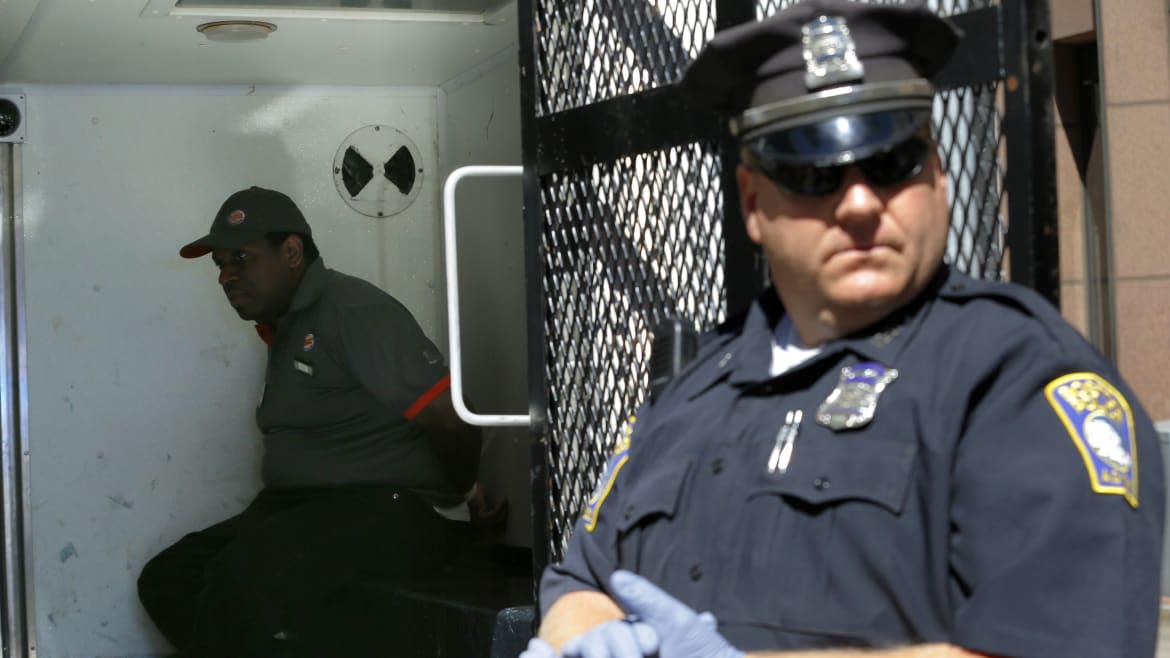Cops Keep Framing Service Workers for the Same Reason They Keep Killing Black People

Cops lie, not just often, but with the bravado and confidence of people who know they will neither be caught nor held accountable. And plenty of those lies are made against people working for crap wages and no benefits in the service industry.
In recent weeks, New York City officers fabricated poisoned Shake Shack milkshakes, a Georgia cop paranoia-conjured a tainted McMuffin, and a Los Angeles officer tweeted photos of what is definitely not a tampon-contaminated coffee. The trail of lies goes back years prior, and includes a Utah cop accusing a Subway employee of putting THC and meth in his drink, NYPD cops making a false report about a razor blade in a deli sandwich, an Indianapolis cop blaming McDonald’s employees for missing food that it turned out he himself had eaten, and two different police in Oklahoma and Kansas independently making up the same lie about fast-food workers defacing their cups with the word “pig.”
There may seem to be no comparison between recent murders of Black people and police lies about their treatment by restaurant workers. But a strain of the murderous police violence on display in extrajudicial killings of Black citizens is also present in the ostensibly more benign falsehoods they push about restaurant workers.
Cops’ Most Deranged Lies and Bizarre Claims About the Protests
History bears out the links, with Black enslavement—that shaper of every American institution, including policing—at the root. The 15.6 million people employed by the restaurant industry include 75 percent of workers in this country who rely on tips to survive. That’s a direct outcome of the post-emancipation era, when restaurants and railroads were among the few industries that hired formerly enslaved Black people, recognizing they could literally pay them nothing and instead insist they scrape by solely on tips.
So closely associated was the idea of tipping with Black workers that in 1902, journalist John Speed wrote, “Negroes take tips, of course, one expects that of them—it is a token of their inferiority. But to give money to a white man was embarrassing to me. I felt defiled by his debasement and servility."
In 1938, as part of the New Deal, Congress established the first federal minimum wage law. But that legislation excluded the overwhelmingly Black ranks of tipped workers, allowing employers to pay sub-minimum hourly rates with customer tips ostensibly making up the difference. The National Restaurant Association, a lobbying behemoth then headed by Herman Cain, negotiated with the Clinton administration to decouple tipped wages from the federal minimum wage in 1996, effectively freezing the former in perpetuity. Over the last 82 years, the federal minimum wage for tipped workers has gone from zero to a measly $2.13 an hour—where it has remained since 1991.
The vulnerable worker class created by this restaurant system “occup[ies] seven of the ten lowest-paid occupations” in America, according to the Bureau of Labor Statistics. People of color, specifically women, are disproportionately represented among restaurant employees, and are often employed in the most poorly paid occupational positions.
Black restaurant workers are tipped less than white workers, research shows, despite providing equivalent levels of quality in service. As a result, while the poverty rate for restaurant workers overall is three times that of workers in other industries, restaurant “workers of color experience poverty at nearly twice the rate of white restaurant workers.”
We know that America’s system of policing is a modernized amalgamation of its roots: Southern “slave patrols” charged with criminalizing Black freedom and ensuring Black subjugation, and Northern forces tasked with oppressing a worker underclass that criminology professor Gary Potter writes was "easily identifiable because it consisted primarily of...poor [whites], foreign immigrants and free Blacks.” By design, America’s police function are essentially “delegated vigilantes” “entrusted with the power to use overwhelming force against the “dangerous classes.””
The job of police, in other words, has always been to use varying forms of violence against the powerless. The state-backed violence of police lies against innocent restaurant workers and the state-backed police murders of Black folks—usually followed by lies—are two sides of an oppressive coin.
Police murder Black members of America’s permanent racial underclass, and lie about toxic coffee orders by members of its worker underclass, because they understand whose public safety they are paid to protect, and whose existence is thereby rendered dispensable and even disposable. Cops know they can kill Black folks and tell lies that endanger economically vulnerable workers with impunity because policing gives them limitless authority over “subordinate” groups.
And cops know that even in the face of unequivocal video evidence there are rarely consequences, much less justice, for their unlawful actions.
Here again, the violence of an American system reifies its bloody foundational intent. And no amount of America’s exceptional self-mythologizing can whitewash—or reform—that truth away.
Get our top stories in your inbox every day. Sign up now!
Daily Beast Membership: Beast Inside goes deeper on the stories that matter to you. Learn more.

